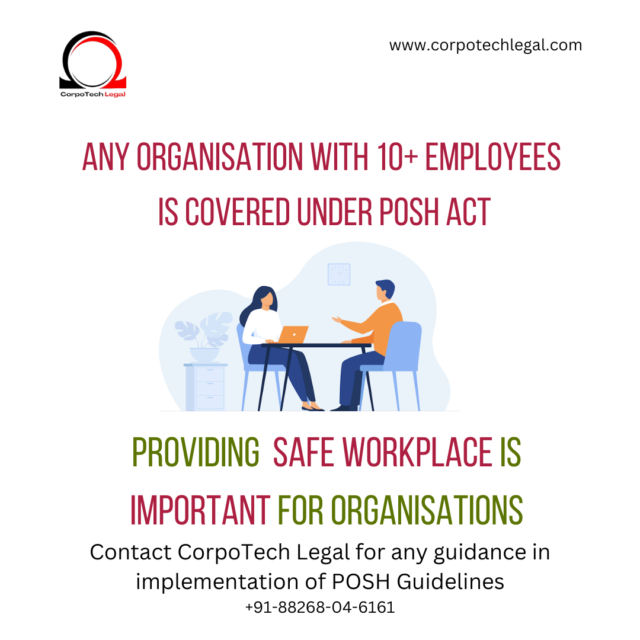Understanding the POSH Act: A Guide for Employees and Managers
The Sexual Harassment of Women at Workplace (Prevention, Prohibition and Redressal) Act, 2013, commonly known as the POSH Act, is a crucial piece of legislation in India. It aims to provide all women with a safe, secure, and harassment-free work environment. All employees and managers need to have a clear understanding of this law to ensure they are upholding its standards. This guide is developed by Legal professionals from CorpoTech Legal
What is the POSH Act?
- Protection against Sexual Harassment: The POSH Act defines sexual harassment broadly, encompassing a range of unwanted and unwelcome behaviors of a sexual nature. This includes:
- Physical advances or contact
- Requests for sexual favors
- Sexually colored remarks
- Display of pornography
- Any unwelcome physical, verbal, or non-verbal conduct of a sexual nature
- Employer’s Responsibility: All Employers having a company with ten (10) or more employees have a legal obligation to:
- Create a comprehensive POSH policy
- Form an Internal Complaints Committee (ICC)
- Conduct awareness and sensitization programs for employees
- Take appropriate action on complaints raised

What Constitutes Sexual Harassment?
Both employees and managers need to understand the various actions that fall under the definition of sexual harassment. The POSH Act recognizes a wide range of behaviors, including:
- Physical Conduct: Unwanted touching, hugging, assault, making sexual gestures, or stalking.
- Verbal Conduct: Sexually suggestive comments, jokes, requests for sexual favors, offensive comments about someone’s body or sexual orientation, spreading rumors with sexual connotations.
- Non-Verbal Conduct: Displaying sexually explicit images, circulating pornography, making lewd gestures, or sending suggestive emails or messages.
- Quid Pro Quo Harassment: Demanding sexual favors in exchange for job benefits or threatening negative consequences if favors are denied.
- Hostile Work Environment: Creating an intimidating, hostile, or offensive work environment due to pervasive sexually harassing behaviors.
The Importance of Perception
The POSH Act places a strong emphasis on the impact of the behavior on the person experiencing it. This means that even if the perpetrator did not intend their actions to be harmful or offensive, they may still be considered sexual harassment if the other person felt uncomfortable, intimidated, or demeaned.
Here’s a way to explain it:
- Shifting the Focus: Under the POSH Act, the focus is not solely on the intent behind the action, but rather on how the action was perceived and experienced by the recipient.
- Example: A colleague might think a compliment about another colleague’s appearance is harmless. However, if the recipient feels uncomfortable or objectified by the comment, it could constitute sexual harassment.
- Reasoning: The law recognizes that sexual harassment harms the victim’s dignity and creates an adverse work environment, regardless of whether the perpetrator meant to cause harm.
The POSH Act is a mandatory statutory law in India; non-compliance carries serious legal and penal consequences.
Key Features of the POSH Act
- Wider Definition of “Workplace”: The POSH Act covers any place visited by the employee during the course of employment, including transportation provided by the employer.
- Protection Beyond Regular Employees: The Act extends to interns, trainees, contract workers, and even visitors to the workplace.
- “Aggrieved Woman”: The complainant, under the POSH Act, can be any woman regardless of age, employment status, or hierarchical position.
- Confidentiality: The Act mandates strict confidentiality throughout the complaint process, protecting the identities of the complainant, respondent, and witnesses.
- Time Limit for Complaints: Complaints must be filed within three months of the incident. However, extensions may be granted under certain circumstances.
How to Raise a Complaint to the ICC
- Written Complaint: The aggrieved woman must submit a written complaint to the ICC detailing the incidents of sexual harassment.
- Assistance: If required, the complainant can seek help from the ICC, the police, an NGO, or any other support person in drafting and filing the complaint.
- Interim Relief: During the inquiry, the complainant can request interim measures like transfer of the respondent or granting leave.
If you are facing Sexual Harrasment, you can seek free advice from CorpoTech Legal. Contact Us
The Role of the Internal Complaints Committee (ICC)
- Inquiry Process: The ICC is responsible for conducting a fair, impartial, and time-bound inquiry into the complaint.
- Principles of Natural Justice: The ICC must adhere to the principles of natural justice, ensuring both the complainant and respondent have the opportunity to be heard.
- Recommendations: Upon completion of the inquiry, the ICC submits its report and recommends actions to the employer. These actions may include disciplinary measures such as warnings, termination, or monetary compensation.
Important Points for Employees
- Zero Tolerance: All organizations must have a zero-tolerance policy towards sexual harassment.
- Recognize Harassment: Understand what constitutes sexual harassment, and don’t hesitate to voice out against any inappropriate behavior.
- Seek Support: Approach the ICC or trusted colleagues if you or someone you know experiences sexual harassment.
Important Points for Managers
- Foster a Safe Culture: Promote a work environment where respect and dignity are paramount.
- Handle Complaints Seriously: Treat all complaints with sensitivity and urgency.
- Support the ICC: Provide full cooperation and resources to the ICC to conduct a thorough investigation.
Remember, creating a workplace free from sexual harassment is a collective responsibility. By understanding the POSH Act and its provisions, we can all play a vital role in building inclusive and respectful workplaces for everyone. Click here to understand How CorpoTech Legal can help companies create a safe workplace
